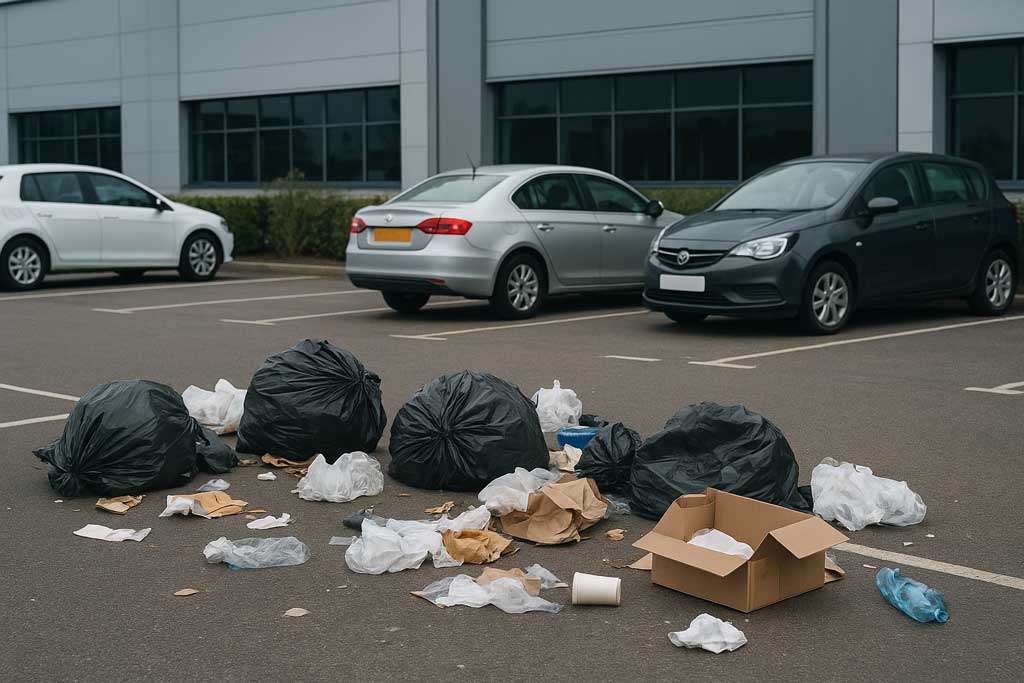Picture this: it’s Monday morning, and your business’s waste bins are overflowing onto the pavement. Customers are walking past with wrinkled noses, your staff can’t access the back entrance properly, and you’re facing potential fines from the local council. What started as a simple oversight has snowballed into a reputation nightmare. This scenario plays out across the UK every day, highlighting why effective commercial waste management isn’t just about keeping things tidy—it’s about protecting your bottom line, maintaining compliance, and safeguarding your business reputation.
The Hidden Costs of Poor Waste Management
Most business owners focus on the obvious expenses: rent, salaries, utilities. But inefficient waste handling can drain resources in ways that aren’t immediately apparent.
Overpaying for collections you don’t need, receiving penalty charges for incorrect disposal, or worse—facing prosecution for environmental breaches—can quickly escalate into thousands of pounds in unexpected costs. A Manchester restaurant recently faced a £2,000 fine simply because their waste contractor failed to provide proper documentation for food waste disposal.
Compliance Nightmares That Keep Business Owners Awake
The UK’s waste regulations are more complex than many realise. The Duty of Care regulations mean that as a business owner, you’re legally responsible for your waste from the moment it’s produced until it’s finally disposed of or recycled. This responsibility doesn’t end when the waste leaves your premises.
If your waste contractor disposes of your materials illegally, guess who’s still liable? You are. Professional waste management services provide the documentation, tracking, and compliance systems that protect your business from these regulatory pitfalls.
Which Businesses Benefit Most?
Hospitality and Food Service
Restaurants, pubs, and cafés generate significant amounts of food waste, packaging, and general refuse. They also face strict regulations around food waste disposal and grease management. A single missed collection during a busy weekend can create health hazards and attract pest problems that could force temporary closure.
Retail Operations
From small boutiques to large department stores, retail businesses produce cardboard, packaging materials, and general waste. Many also deal with returns and damaged goods that require secure disposal to prevent counterfeiting or brand protection issues.
Office-Based Businesses
Even the most digital-forward companies generate paper waste, old IT equipment, and confidential documents requiring secure destruction. Professional services firms, in particular, must ensure client confidentiality through proper document disposal.
Manufacturing and Industrial Sites
These operations often produce hazardous materials, large volumes of recyclable materials, and specialist waste streams that require expert handling and documentation.
The Real Value of Professional Waste Services
Beyond simple collection, professional commercial waste management services offer strategic benefits that directly impact your business success.
Cost Optimisation Through Smart Scheduling
Rather than paying for fixed weekly collections regardless of need, modern waste management services can tailor collection frequencies to your actual requirements. A graphic design studio might need twice-weekly paper recycling during busy periods but only fortnightly collections during quiet months.
Environmental Credentials That Customers Care About
Today’s consumers increasingly choose businesses based on environmental values. Professional waste services provide detailed recycling reports and environmental impact data that you can use in marketing materials and corporate social responsibility communications.
Technology Integration
Leading waste management providers now offer digital platforms that track your waste streams, predict optimal collection times, and provide real-time updates on service delivery. This technology integration helps businesses make data-driven decisions about their environmental impact.
Making the Switch: What to Expect
Transitioning to a professional service typically involves a waste audit to understand your current needs and identify optimisation opportunities. Many businesses discover they can actually reduce costs while improving service levels and environmental performance.
The key is finding a provider that understands your specific industry challenges and can scale services as your business grows.
Your Next Steps
Don’t wait for a waste crisis to force your hand. The most successful businesses treat waste management as a strategic decision, not an afterthought. By choosing the right commercial waste management partner, you’re not just solving a operational necessity—you’re investing in your business’s reputation, compliance, and long-term sustainability.
Start by evaluating your current waste streams and costs. You might be surprised by the opportunities for improvement hiding in your bins.
Featured Image: AI Generated.

